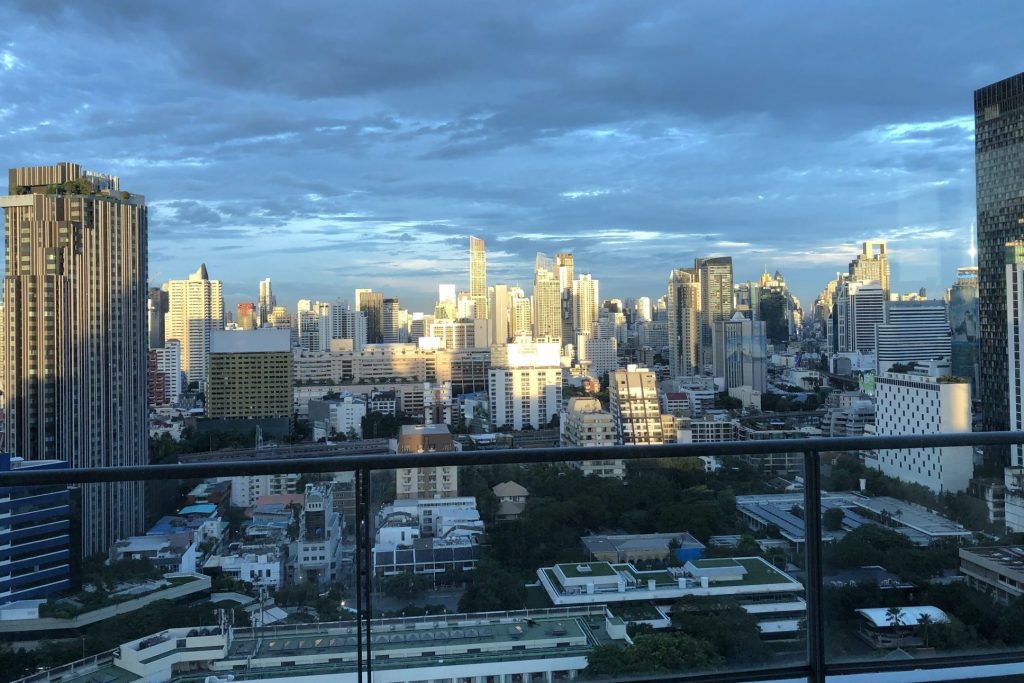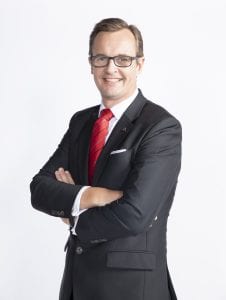Skift Take
Covid-19 unearthed hotel vulnerabilities, but Thai asset owners are not retreating. That means more branding opportunities for chains, but how they handle the pandemic will be closely watched.
On the website of S Hotels & Resorts, an offshoot of Singha Estate, a note says: “We wish to purchase hospitality projects in Thailand. Interested in selling? Contact us.”
Thai real estate developers with hospitality ventures are on the prowl for opportunities in the country as expectations mount that distressed hotel assets will start to appear in the third or fourth quarter as strains of more months without revenue bear down on some players.
Companies with dry powder such as S Hotels & Resorts and Asset World Corp., which were listed in the fourth quarter of last year, believe this could mean an acceleration of their expansion plans.
Asset World, the hospitality and property firm of Thai billionaire Charoen Sirivadhanabhakd, in particular, has deep pockets for strategic acquisitions. Its stock market listing was one of the largest corporate initial public offerings ever recorded in Thailand, raising $1.6 billion (48 billion baht).
“We are in a strong financial position from our IPO last year. We have limited debts and are looking at investment opportunities. Our expansion plans have not slowed down. On the contrary, we think this is a good opportunity to accelerate them,” Asset World’s chief hospitality group officer, Stephan Vanden Auweele, told Skift.
The company intends to double its portfolio to at least 30 hotels with 10,000 rooms by the end of 2030. Its focus is only on Thailand. Currently, Asset World has 15 hotels in operation in Bangkok, Hua Hin, Samui, Phuket and Chiangmai (see chart here). Another four are being built, while six to seven projects will start construction in the next couple of months or next year. New destinations it is entering include Krabi and Pattaya.
Apart from hotels, Asset World also develops retail/office buildings and lifestyle projects in tourist locations. One such is Asiatique, an open-air riverfront mall in Bangkok where it is developing a new landmark tower designed by Adrian Smith and Gordon Gill — architects of New York’s Central Park Tower New York and Dubai’s Burj Khalifa — that will include an 800-room Marriott hotel.
An expansionary Asset World is good news for hotel chains Marriott, Hilton and IHG, which manage or franchise a number of its hotels under various upmarket brands, and could look forward to more contracts in the future. The company also works with Melia, Okura and Banyan Tree groups and will soon announce a “large framework agreement” with another big hotel operator, said Auweele.
Such an agreement sees Asset World committing to a certain number of rooms that will carry the operator’s brands, instead of negotiating fees for every contract. It’s similar to the deal it signed with IHG in January, where 1,200 rooms were committed, starting with a 306-room hotel in Chiang Mai which is branded an InterContinental.
smart strategy?
There are good reasons why Thai real estate developers should actually think twice about the hospitality business. Covid-19 shows hotels can actually experience zero revenue. Prospects of real numbers of international arrivals returning anytime soon dim by the day. There are warnings from hotel consultants for owners to forget levels achieved in 2019.
“Those 2019 levels? We’re not going to see them years from now,” said Jesper Palmqvist, STR area director Asia Pacific.
It took four years for occupancy in Bangkok to recover from the global financial crisis, 10 years for average daily rates. This crisis cuts deeper, he warned.
“Instead of asking, when will I have 2019 levels again, reframe the conversation to, when will I have realistic levels that provide a fair bottom line, which both owner and operator can agree on, and how will I get there,” said Palmqvist at a recent online Thailand Tourism Forum organized by C9 Hotelworks and American Chamber of Commerce Thailand.
But far from retreating, Thai hotel asset owners are advancing. Companies such as S Hotels & Resorts and Asia World must keep creating value for shareholders. Others, such as Siamese Asset, see hospitality as a tactical gambit in a long-range pandemic downturn.
The Thai construction company, which has built five-star hotels for owners, is now building them for itself. According to CEO Kajonsit Singsansern, it has 10 hotel/branded residence projects in Bangkok. Four will open within the next 24 months under Wyndham Hotels & Resorts’ brands.
“We not only know how to build high-quality hotels but we also have the interest to enter the hotel business,” he said.
As its expertise is in construction, Siamese Asset has partnered Kew Green Hotels UK for the management side to develop hotel/branded residence projects not just in Thailand but South-east Asia. The joint venture, Siamese and Kew Green Management Company, formed last month, marks Kew Green’s foray into Asia. All of its 55 hotels, save one in Hong Kong, are in the UK under franchise partners including IHG, Marriott and Hilton.
Kew Green is owned by by HK CTS Metropark, part of China Tourism Group, which could be a factor for Siamese Asset in the partnership. China is Thailand’s number one market with 11 million tourists last year — more than all of ASEAN combined. Chinese interest in branded residences is also high in Asia. A C9 Hotelworks study found that mainland Chinese already have snapped up 57 percent of luxury branded projects in Asia’s first-tier cities.
Value of Chains
Continued appetite for the hospitality sector among hotel asset owners augurs well for chains’ expansion into Thailand.
Bigger chains, seemingly, are in favor among owners in a coronavirus-stricken hotel world, although competition will be fiercer as owners can see how chains react when placed under immense stress.
Asset World’s Auweele said there is a “variance” in operators’ responses.
“Marriott is proactive in many areas, focusing on reducing costs and communicating sales and marketing strategies. They struggle with costs but I’d say they have a strategy and a global approach to deal with it. Smaller operators don’t even know how to address this; they are running constantly behind the reality of things.
“So this crisis becomes an interesting story on what a brand stands for. Is it just a logo on a building, or is there strategy and vision behind it? For smaller operators, it will become very complicated now.”
Asked what he’d wish for chains to do better in these times, he said increase their efficiency in Thailand.
“I’ve worked in the Far East, Europe and the Middle East and have a good overview of how cost models work in different parts of the world. I do believe Thailand could learn a bit from that. I’m not saying it has to get to the efficiency standards of Singapore or Hong Kong but definitely there is some gap. So it’s a good thing hotel operators are now seriously looking at global rather than country efficiency.”
“Another thing, if only large operators could be more dominant and kick out the OTAs (online travel agencies),” he said. “Anyhow, with Google coming onto the scene and challenging the OTAs, I do believe the distribution landscape might be finally redesigned.”
He would stick to his strategy of teaming up with the big chains.
“For one thing, people look at a brand to be reassured about hygiene, correctly or not. Our Hua Hin hotel, which is a Marriott, was running close to 200 RGI (revenue generation index, which measures a hotel’s RevPAR against the average RevPAR in the market). Definitely there’s a tendency to go to big brands.
“Secondly, it’s about staffing. The big chains have a pipeline of managers who grow through the ranks.
“Thirdly, we believe in longterm partnerships. If you team up with Expedia or Booking, it’s a strategy but an opportunistic one, more about making money than a relationship. I remember when a financial controller in one of our previous hotels forgot to pay a month to Booking. They took us down. That’s when you ask, is this the kind of business you want to be in?”
Trends With Benefits
But why the strong faith in Thailand’s hospitality sector?
“Thailand has traditionally bounced back from any sudden downturn in business levels due to world or regional challenges. I witnessed that personally when working at a property in Phuket on the morning of the tsunami in 2004. Covid-19 will be managed effectively. All of our brand partners have extremely diligent protection protocols for guests and team members. The investment climate is always positive in Thailand,” said Chris Dexter, CEO, Kew Green Hotels.
Some trends that emerge from the pandemic are beneficial for Thailand, said Asset World’s Auweele.
“Shorthaul travel is one. If the trans-Atlantic east to west movement is not going to be dominant anymore, rather, north to south in Asia, it changes the landscape. Thailand has a huge infrastructure that other countries are only building up; it understands that transportation is the key to developing tourism. It also has a good reputation for hospitality. It’s always the number one or two for every Asian source market, be it China, India and so on. That’s why Thailand will rebound.”
Another positive trend for the hotel business in Thailand is the desire of travelers to go to less-crowded places, which drives S Hotels & Resorts to explore opportunities for upper mid-scale hotels in secondary Thai destinations, said its CEO, Dirk de Cuyper.
“Destinations such as Sukothai and Ayuthaya are well known but they don’t attract a big tourist footprint. They have a cultural component and are an ideal combination with prime destinations such as Phuket, Hua Hin or Samui. The tourism authority’s push on secondary destinations will only accelerate with Covid-19.
“There’s also a strong drive to improve the roads, highways and trains infrastructure in the next two to three years, which will change the landscape,” de Cuyper said, referring to projects such as the high-speed train connectivity from Bangkok to Chiangmai or the eastern economic corridor between Bangkok and Pattaya.
The company focuses on leisure travel and owns 39 properties with 4,647 keys in five countries, UK, Thailand, Maldives, Mauritius, and Fiji. They include six Outrigger hotels, 27 Mercure and two Holiday Inn hotels following the joint acquisition of Jupiter Hotels UK with Fico Group. Its latest project is Crossroads, a family oriented integrated resort in the Maldives which boasts a Hard Rock hotel and a Curio Collection by Hilton.
As it has only four hotels in Thailand, there’s room to grow, said de Cuyper. S Hotels & Resorts wants to double its portfolio in the next five years and has set aside at least $322 million (10 billion baht) for expansion in the next couple of years.
“Our capital structure is strong after the IPO. We’re sitting at a low gearing ratio and we have the backbone to go out to the market in the next three to five years. It’s a matter of assessing what is the right investment to do post-Covid, what the new trends are going to be.”
Have a confidential tip for Skift? Get in touch
Tags: asset sales, coronavirus, hilton, hotel investments, ihg, marriott, thailand
Photo credit: Pictured is the Bangkok skyline. Developers are looking to buy hotel assets going out of business because of the pandemic. Raini Hamdi / Skift

